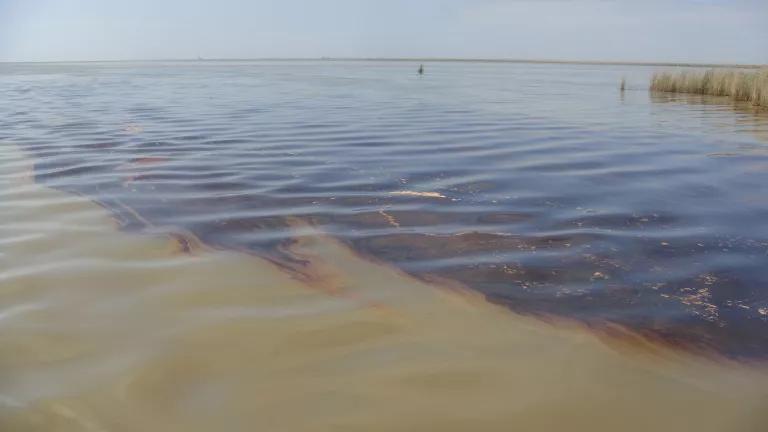
Sunrise off Galveston Island, TX
The Biden Administration has proposed a new federal offshore leasing program that could include leasing in as many as eleven areas in the Gulf of Mexico and Cook Inlet, Alaska and would enable continued development on the Outer Continental Shelf (OCS) for decades to come.
NRDC submitted comments today opposing the Bureau of Ocean Energy Management’s (BOEM) offshore oil and gas leasing program. BOEM’s proposal fails to make the reforms needed to protect the environment and coastal communities, and curb the accelerating climate crisis. Additionally, 61 groups sent in a letter asking for no new offshore oil and gas leasing and NRDC members and activists sent in over 93,000 comments asking for no new offshore oil and gas leasing.
We stand with coastal communities who would be harmed by this plan. BOEM’s proposed program continues development of offshore areas in the Gulf of Mexico and Cook Inlet, Alaska. The proposal will compound the already severe environmental burdens carried by Gulf communities who have lived with the petrochemical industry for decades. It will create unacceptable risks to the Gulf of Mexico ecosystem, which supports a diverse array of marine life and a valuable fishing industry, and which has yet to recover from the BP Deepwater Horizon disaster. Continued drilling in the Gulf of Mexico could be a devasting blow for the critically endangered Rice’s whale, which has less than fifty individuals remaining and whose habitat overlaps with the planned development areas.
BOEM’s proposal also threatens the unique ecosystem of Cook Inlet, Alaska, which supports an endangered population of beluga whales, and the livelihoods of coastal communities, fishermen, and indigenous communities. We have previously commented to BOEM about the need to say no to continued fossil fuel development in the region.
BOEM should commit to a clean energy future and issue a program with no new leases. BOEM has ample authority to issue a zero-lease schedule and reform its leasing program. Existing energy reserves, as well as increasing amounts of renewable energy and clean energy policies, ensure that the nation’s energy needs can be met without opening up new lease areas for development. Further, issuing new leases is contrary to BOEM’s mandate to protect marine, coastal, and human environments under the Outer Continental Shelf Lands Act (OCSLA).
As we explain in our letter, BOEM’s analysis is also flawed because:
- BOEM fails to adequately consider key OCSLA factors – The agency has failed to consider key environmental, geographic, and economic factors required by OCSLA. The flaws in its analysis include: failure to fully consider the environmental and human costs of continued oil and gas development in the Gulf of Mexico, failure to consider the rapidly changing energy landscape, of which the newly-passed Inflation Reduction Act (IRA) is part, inadequate accounting for the risks to the critically endangered Rice’s whale, ignoring the unique risks posed by deepwater development and the potential for another Deepwater Horizon disaster, and incorrectly evaluating the implications of the proposed program and a no-lease alternative on jobs and state revenues.
- BOEM fails to appropriately balance the costs and benefits of continued oil and gas development – BOEM selectively omits certain costs from its analysis – such as the costs of combusting fossil fuels and catastrophic oil spills – which skews its cost-benefit analysis to artificially favor continued development. BOEM continues to rely on the flawed MarketSim model which has been critiqued by various courts and remains a poor model to evaluate fuel substitution and subsequent costs and benefits. The flaws in BOEM’s analysis of the OCSLA factors invalidate the cost-benefit balancing analysis BOEM must conduct under the statute.
- BOEM’s National Environmental Policy Act (NEPA) analysis is flawed – BOEM fails to comply with NEPA’s requirements to fully evaluate the direct, indirect, and reasonably foreseeable impacts of the proposed program, keeping the public in the dark about the true impacts of continued oil and gas development. The flaws in BOEM’s NEPA analysis include: an inadequate discussion of the full impacts of greenhouse gas emissions resulting from OCS development, failure to fully consider the effects of oil spills, ignoring the full suite of impacts to threatened and endangered species, and not accounting for the toxic legacy of the Deepwater Horizon disaster and the potential for other similar events.
We need to transition away from continued reliance on offshore oil – there are better ways to meet our energy needs, and this transition will ensure we protect coastal communities and ocean ecosystems.
BOEM must revise the proposed program and reissue a program with no new lease sales.



